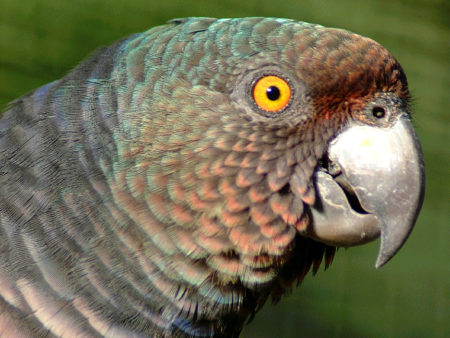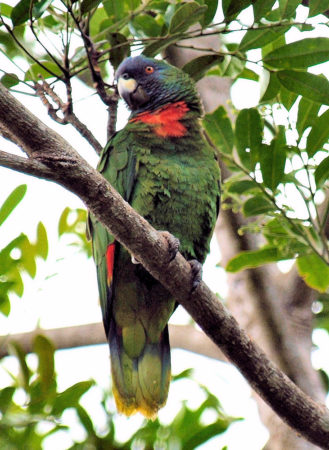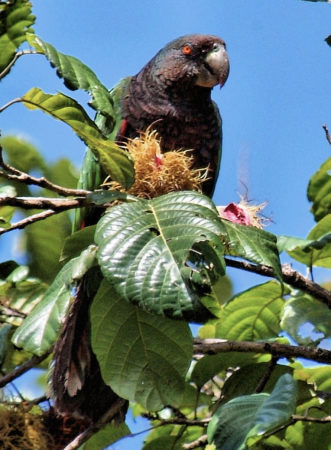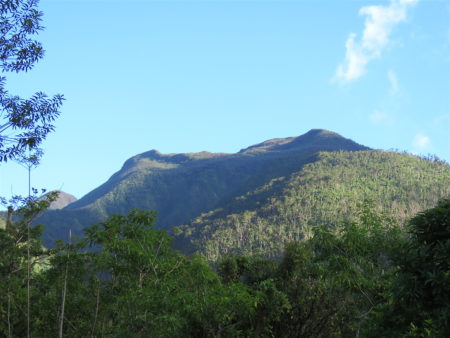
In April 2018, we published an article about the controversial export of threatened parrots from Dominica to Germany. After the 2017 hurricane season, the Association for the Conservation of Threatened Parrots (ACTP) exported two Sisserou (Imperial Parrots; Amazona imperialis) and ten Jaco (Red-necked Parrots; Amazona arausiaca) in March 2018. ACTP claimed that establishing a captive breeding population at their facility in Germany was an “emergency measure.”
A new report by Lisa Cox in The Guardian has uncovered just how dishonest ACTP has been in its dealings with captive birds. It also reveals the criminal history of its director, Martin Guth. This new information amplifies our initial outrage and serious concern for the exported birds from Dominica. Before we highlight the report’s findings, here is a brief history of events:
Timeline
17 Mar 2018:
2 Imperial Parrots and 10 Red-necked Parrots are secretly removed from Dominica’s Parrot Conservation and Research Centre. They are exported via private charter plane to ACTP’s facility in Germany.
3 Apr 2018:
BirdsCaribbean publishes their first blog post about the incident, describing the legal, scientific and ethical problems with this export.
5 April 2018:
Thirteen organizations, including BirdsCaribbean, prepared and signed a letter to the Executive Director of the United Nations Environment Programme (UNEP) expressing outrage over the transfer. The letter was also sent to representatives within CITES, the government of Dominica, the US Fish and Wildlife Service, and the European Union, .
April 2018:
ATCP publishes a statement in responses to the letter arguing that an external facility is the best option to protect these birds from natural disasters.
1 May 2018:
Forty international researchers, veterinarians and conservation leaders, including BirdsCaribbean, continued to express concern. They recommended the repatriation of the parrots and a full investigation into ACTP’s activities. This letter was sent to Dominica’s Director of the Environmental Coordinating Unit and Director of Forestry, Wildlife and Parks in addition to Germany’s Federal Agency for Conservation of Nature.
10 Dec 2018:
The Guardian publishes two articles by Lisa Cox about ACTP. The first is an exposé into how ACTP has acquired one of the world’s largest collections of endangered parrots. The second details Australia’s own dealings with ACTP, despite concerns.
What did the investigative report reveal?

Dominica has not been the only country to have questionable dealings with the ACTP. Since 2015, ACTP has removed 232 parrots from Australia (80% of all live native bird exports) including endangered birds like the Carnaby’s Black-Cockatoo. In Brazil, the Spix’s Macaw is extinct in the wild; ACTP has 90 per cent of the existing global population (142 of the 159 birds left). The organization has also acquired endemic parrots from St. Lucia and St. Vincent.
The article reports that the ACTP has a license to operate as a zoo in Germany. Exports to zoos are typically granted under the assumption that the birds will be on exhibit. But the site is not easily accessible by public transport, there is no car park, and no clear indication that the facility is open to the public. There are no signs that offer information about opening hours or admission prices. Also, ACTP is not registered with any major international zoological association.
So what happens to the birds? That remains unclear as ACTP does not publish inventories, animal transactions, or financial reports. The article does note, however, that the German federal conservation agency is aware of private social media messages that show Australian birds apparently imported by ACTP offered for sale for hundreds of thousands of dollars.
The Guardian reporters describe Martin Guth as a convicted criminal, former nightclub manager, and “unofficial debt collector.” He served a five-year jail sentence for kidnapping and extortion in 1996 and a 20-month term for extortion in 2009. The reports also allege that “at least one individual who works with ACTP has a conviction for involvement with illegal bird trading.” German authorities reportedly deny any knowledge of Guth’s criminal background.
Yet, when ACTP applied to the Environment Department in Australia to be recognized as a zoo, it was asked: “If the zoo is privately owned, has the owner ever been convicted of a criminal offence or declared bankrupt?” ACTP responded that it was not privately owned. Its response in relation to criminal offences was marked “n/a”.
The Guardian reports have sparked strong reactions among conservationists on social media. Stephen Durand from Dominica’s Forestry Department said they confirm his worst fears: “When Martin Guth visited Dominica in January 2018…his first declaration was that he had absolutely no interest whatsoever to conduct any breeding programme for Dominica’s Parrots. And so here it is. History to confirm that Dominica’s Parrots were traded to a fraudulent zoo in the name of conservation, owned by a convicted criminal businessman.”
Read the full article in The Guardian here.
What’s next?

BirdsCaribbean and our fellow conservation organizations will continue to put pressure on authorities and individuals responsible for the controversial export of Dominica’s wildlife to ACTP. We stand by our recommendation to repatriate the 12 parrots. First, transfer the birds to a credentialed, experienced zoological facility to check for diseases. If deemed healthy and disease-free, return the birds to the Parrot Conservation and Research Centre in Roseau, Dominica. We also recommend a full investigation of all parrot imports by ACTP into Germany as well as ACTP’s activities with CITES I species (including inventory history). Finally, we support a ban on all future transfers of Caribbean parrots to the ACTP.
Dr. Paul R. Reillo, President of the Rare Species Conservatory Foundation and co-Director of the Tropical Conservation Institute at Florida International University, points out: “Dominica’s parrots have survived hurricanes for millennia, and wild populations have rebounded thanks to broad-based, on-island conservation measures.” Dr. Reillo, who has worked in Dominica for over 20 years, also believes the parrots should be returned as soon as possible.
The lush habitat for which Dominica is famous, and the birds that live in it, were dealt a bitter blow by Hurricane Maria. However, like its people, the island is resilient – and so are its birds. The island’s biodiversity should be allowed to recover at its own pace – and within its own borders, as Dr. Reillo notes.
Sign the petition
This Dubious Organization Is Raising Rare Birds to Sell to Private Collectors: Care2 Petition with 52,000+ signatures. Please sign and share!
Links to articles that have appeared in Brazil and across Europe, linking ACTP to organized crime:
Was hat Arafat Abou-Chaker mit einer Papageienzucht in Brandenburg zu tun?
Abou-Chaker und die organisierte Vogelzucht
ACTP – Papageienzucht mit fragwürdiger Artenschutz-Motivation


Many things seems very, very odd and wrong with this rare bird transaction, including secrecy of the transaction, token gift giving as part of it, and lack of transparency and information to Dominican public about the condition of the birds. If they are “transferred “ it means we still own them. But is that so?
Why did not Dr Thomas recommend a well known breeding and conservation research organization and facility, with a track record of good experience and success, to undertake what he said ACTP would be undertaking. There are many organizations who helped on island with the parrot research, why were they not consulted and their recommendations taken on board in that decision making process.
Dr Thomas needs to apologize to the Dominican public for a poor decision.
We have money hungry politicians who will sell their Mothers for campaign funding. We the People are working hard to rid ourselves of them.
It’s a shame on the DOMINICAN GOVERNMENT to engage in this behavior – no respect for our wildlife, our pride, our National bird. Please bring it back to our ISLAND DOMINICA.
Sadly, there are greedy politicians in every country, John. It is indeed up to the people to vote them out of office. Glad to hear the people of Dominica are trying to do this. Never give up!!!
We are asking the same questions that you are asking, Anthony. We hoped to have some answers but none have been forthcoming.
Thank you for your concern Desmond. We empathize with the people of Dominica. We hope the birds will be returned and that this will never happen again.